
Published: Last Updated:
Readtime: 16 min
Every product is carefully selected by our editors and experts. If you buy from a link, we may earn a commission. Learn more. For more information on how we test products, click here.
Darcy Moore is having a mammoth year. After a disappointing 2024, the Collingwood Football Club captain has deftly steered his team to the top of the AFL (Australian Football League) ladder, secured finals qualification two months out from their commencement, and further cemented his leadership credentials by taking on the role of president of the AFL Players Association.
Both inside and outside the game, Moore’s advocacy for men’s mental health awareness has helped to keep it in the national conversation, but despite his considerable responsibilities, the star footballer still finds time to admire the visual and sonic delights of Denis Villeneuve’s Dune films and agonise over his submission to Triple J’s Australian Hottest 100.
We sat down with Moore to discuss his strategy in the run-up to the finals, how he uses music to get the most out of himself and his players, and find out precisely what it is he says to the team in those famed pre-game huddles.

Man of Many: Congrats on a fantastic footy season so far. How’s 2025 treating you?
Darcy Moore: It’s been great. The team’s performing really well, and everyone’s in a good space. As of last weekend, we’ve officially qualified for the finals, so the coming weeks are about sharpening the sword for the real stuff in September.
What have been your highlights of the season?
We had a pretty poor performance in our first game (Collingwood went down to GWS Giants 104-52). So the group’s ability to respond to that was probably my biggest highlight. Not starting the season the way you want, but then showing the resilience to turn it around and get back on track by winning five in a row means a lot.
How was that experience as captain? You shoulder enormous responsibility when it comes to shifting the team’s trajectory.
Totally, but situations like that are a great way to get feedback from the group about where everyone’s at, and we’re fortunate in that we have a lot of experience and trust each other, so we know what we’re capable of. It just makes you proud when you show that sort of resilience.

This year has held significantly better fortunes for the team than the last. What have been the key differences?
I think last season was just about the closest competition in history. With just the last couple of rounds to play, there were 13 teams in the running for the top eight spots. It felt so close, and we weren’t able to execute in key moments. We were losing close games and stumbling at the wrong times. This year feels different. There’s a more established top eight, and we’ve added some new members to our team as well, which always keeps things fresh.
We’ve been getting the balance right. We know when to take a breath, relax, have a bit of fun, and then when to lock in and focus. I think I’m personally doing that really well, too. I’m able to stay in my lane, stay in my zone, stay relaxed and prepared to play, but then I’m locking in and working hard at the right time.
It’s your third season as captain. How have you evolved in that role?
I’ve evolved a lot, to be honest. I feel like my values have stayed the same, as in I’m still big on having a winning culture that simultaneously makes everyone feel safe, included, and values everyone’s voice. But I’m learning to lean on others, delegate as a leader, and hand responsibility over. I’m also getting better at training up the guys around me in their leadership skills, giving them opportunities to develop and throwing them in the deep end from time to time.
How would you describe your leadership style?
My leadership philosophy is based around service. I see leadership as being in service to the people that you’re leading. I want to constantly be listening and responding to the needs of the group. That’s my number one philosophy.
I want to lead in an ambitious, high-performing environment, but also somewhere people can be themselves and differences are celebrated. Being thoughtful and reflective is another big part of it, so I want to act with intent and avoid mindlessly going through the motions.
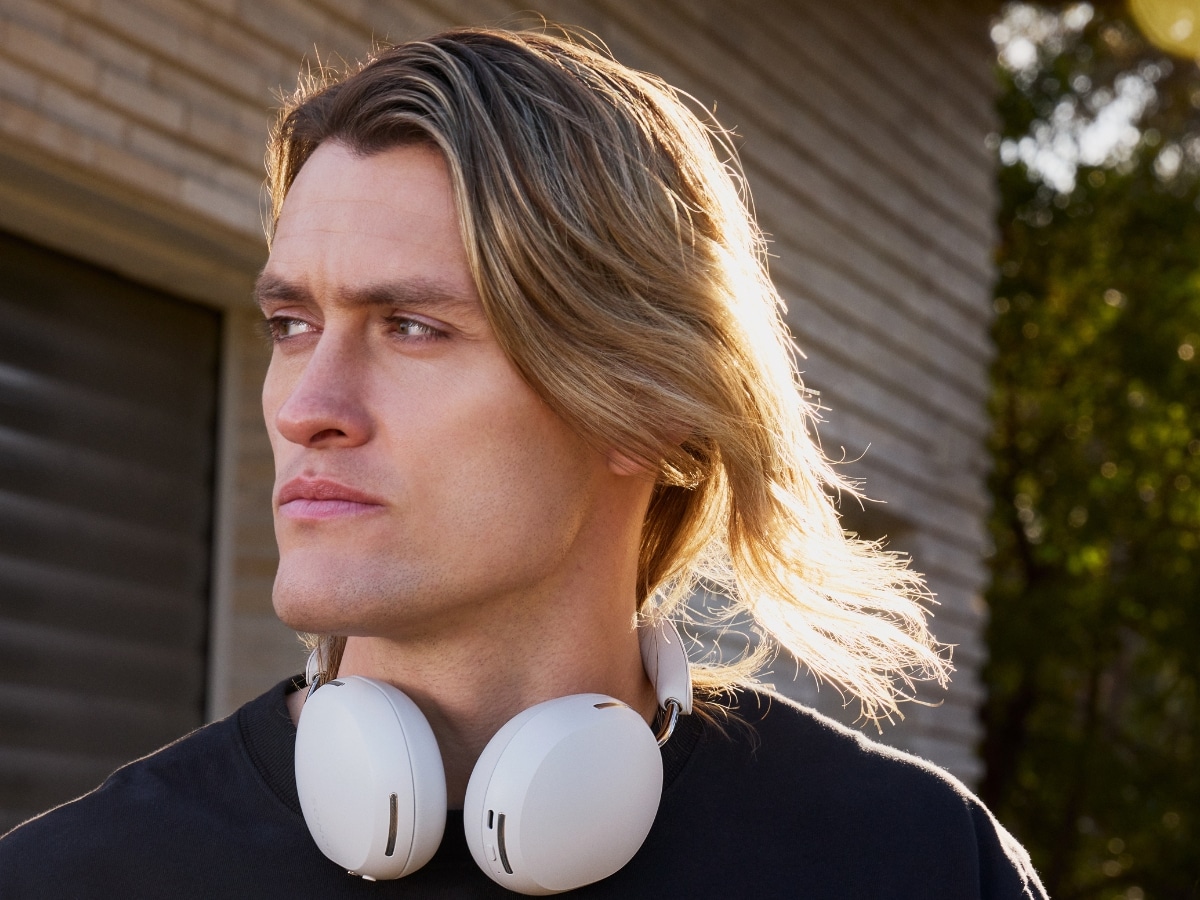
It comes across as a very contemporary leadership style, almost like a new approach to the captaincy.
I think that’s probably fair to say. Football has clearly had a particular type of culture for a long time, and I’m seeing now that 18- and 19-year-olds are coming into the industry who have grown up in a pretty different world, are wired and act a bit differently. So, as a 30-year-old, I’m very much the bridge between that traditional football culture and the younger demographic coming through.
You’re particularly known for your huddles with the team at every game. The AFL-mad members of the Man of Many team were begging me to ask if you could give us an idea of what you’re saying to your players in those moments.
It’s a trade secret, unfortunately, so I can’t give away too much. To be honest, at that stage, it’s mostly about reinforcing pretty basic things. We have a mature group who can handle a lot of strategy talk and high-level tactical changes in-game. So that’s all the complicated X’s and O’s stuff. But when it comes to the last thing I say a minute before the ball is bounced, it’s more about fundamental things, reminding everyone that you can’t do the complex stuff without getting your hands dirty first.
You’re also someone who advocates for professional players not making football their entire identity.
I’m definitely strong on having an off-field identity, and that means having a lot of interests, passions, and pursuits away from the game. That way, when you have your time and you’re meeting the demands in the game, you’re more refreshed, balanced, and have more perspective. Because it can be a very consuming industry and job.
I also advocate for that constantly with young players, encouraging them to broaden their horizons, try new things, and push themselves when they’re away from the game, whether that’s to develop new passions, studies, or vocations. It’s a tough job that can be all-consuming, so I want to encourage them to explore themselves away from the game as much as within it.
You’re leading by example in that regard by pursuing a master’s degree at the moment, aren’t you?
I am, yeah. I’m studying a Master’s in International Relations.
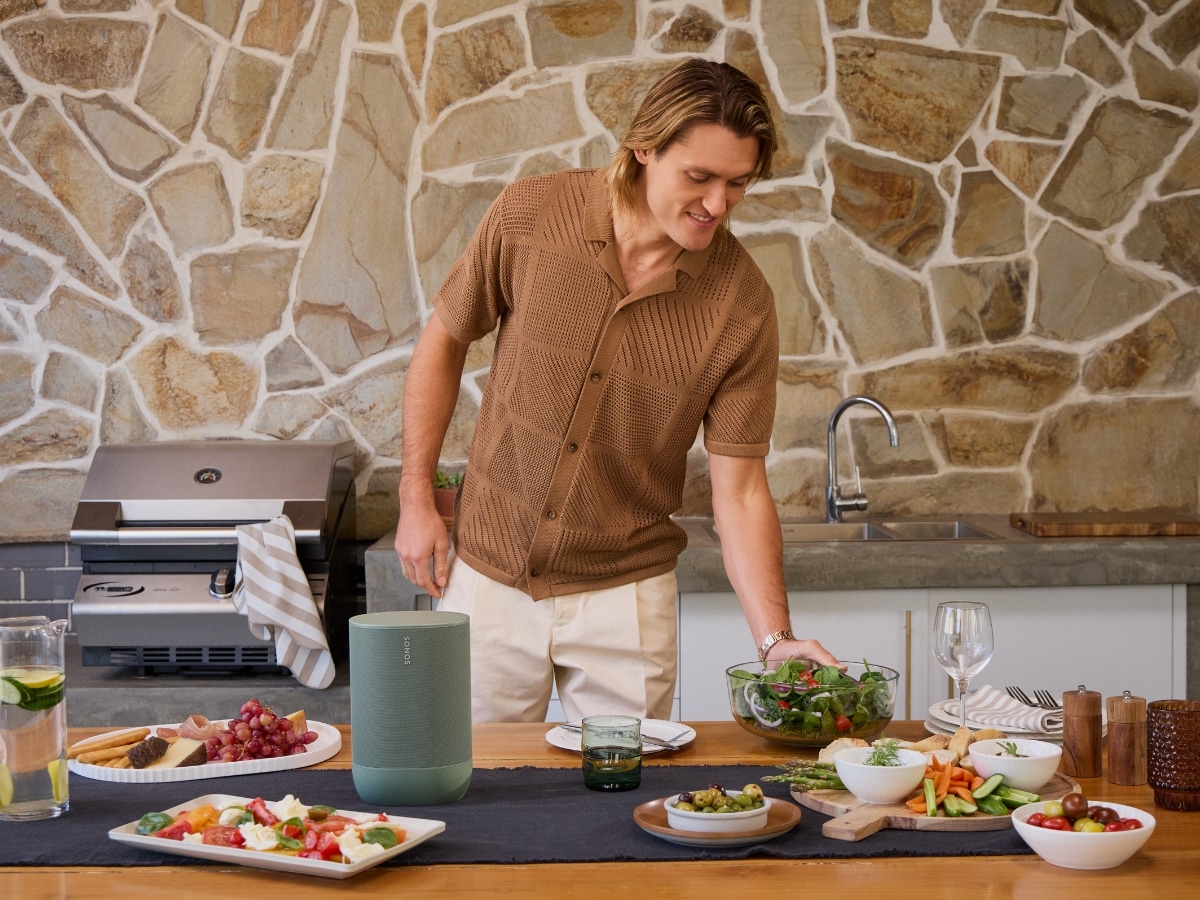
Is that with a view to what might come after footy, or is it just more to broaden your horizons?
I think a bit of both. I initially started purely out of an interest in global affairs and how the world works. But the more I’ve studied and met people in different sectors, there might be an ambition there for me to work in that sector in one capacity or another. But I don’t know exactly what that looks like yet.
You face considerable pressure on a weekly basis. How do you manage that? Is it something you’ve had to hone over the years?
I think I manage it in a pretty practical way. It’s about taking the time to do things that make me feel centred and focused. It’s making time for the things I’m passionate about, whether that’s listening to music, exploring the arts, or reading great books and literature. I love that. I love cooking as well. When you’re making time for those simple, immersive parts of life, that helps to manage the pressure. Otherwise, you can mindlessly get swallowed up by the relentlessness of the job.
When I’m performing at my best and handling pressure at my best, I’m always listening to great music, passionate about books, cooking good food, and connected to my friends — all those sorts of things.
What are you listening to at the moment?
I’ve had some new albums on rotation lately. Loyle Carner just released a new album (hopefully !), which I’ve been listening to a lot. He’s a British rapper who’s pivoted into a spoken-word style. I’ve been listening to HAIM’s new album, I quit, and Lorde’s Virgin. I was just telling my girlfriend last night that when the lead single from Virgin came out I thought it was a terrible song, but I admitted last night that it’s become one of my favourite songs of the year now. It’s really grown on me. It’s become a real earworm, like an anthem for my subconscious.
I also think it really helps to have good gear when you’re listening to songs that are thoughtfully produced. A good-quality pair of headphones like the Sonos Ace ones I have here make a real difference. Mark Ronson just collaborated with RAYE, another British artist I’m loving, to make a song called “Suzanne”. And I think with the noise-cancelling performance of these headphones you get lost in it. That immersive quality helps you distinguish between mediocre music and great music when you listen to it properly.

Speaking of great music, some songs are intrinsically tied to the AFL. Are there any songs of that ilk that particularly speak to you?
It’s so funny. “Holy Grail” by Hunters & Collectors was the theme song for Channel 10’s footy broadcast when I was between 6 and 10 years old, and I was so obsessed. It was my peak fandom. I hear that song now, and I’m instantly transported back to watching the football when I was a kid. That song is so synonymous with footy for me.
Apart from that, as the years have gone on and the stadium experience has improved, sound has become a bigger part of the pre-game ritual. For example, Port Adelaide at the Adelaide Oval has the “Never Tear Us Apart” ritual, and even as an opposition player, that’s really cool. It’s such a unique experience. You’re out there, about to compete, and you’ve got the fans belting out an INXS anthem. It’s such a cool moment.
And then there’s playing against Fremantle at Optus Stadium. Kevin Parker from Tame Impala wrote that “Freo” anthem they play before the game and at half time. I’m a big Tame Impala fan, and whenever that comes on, I always get a kick out of that blaring around the stadium. So, how they all use sound differently is a fun part of playing in different stadiums around Australia.
While we’re on the subject, is there anyone you’d would like to see performing at the grand final this year?
There are plenty of artists I think would be great, but as someone who loves Australian music, I try to support young Aussie artists. So I’d love to see an all-Aussie lineup. I understand the commercial appeal of a big international headliner, but I think that’d be cool.

Triple J is doing the Hottest 100 of Australian Songs at the moment. What are your top picks?
Trying to get it down to 10 songs is just so difficult and I think it speaks to how much good Australian music gets slept on. We had a bit of a listening party over dinner last night with the Sonos speakers blasting all around the house, and we were reminiscing on some iconic Australian songs.
Where I landed early was, I think “Walking on a Dream” by Empire of the Sun is up there for me along with “Somebody That I Used To Know” by Gotye. We also gave a bit of a listen to The Veronicas’ debut album, The Secret Life Of…, and there were plenty of bangers in there. Tame Impala’s “Let It Happen” has to be in there. Again, that’s so well produced that it just gets better and better as time goes on. It’s gonna be a challenge to get it down to 10. Please don’t ask me to do that.
That’s a strong list already. Thinking about music in terms of pursuing your footy goals. How does it fit into your routine as a player and a captain?
The biggest way is probably that I’m the one in the locker room who takes control of the speaker. I have a Sonos Roam 2 speaker, and when I get in at about seven o’clock in the morning, I’ll just put on some tunes, just to set the mood and create a vibe in there. Clearly, that’s a players-only space, where we hang out and have team conversations. So, I take it on myself to be the resident DJ, playing music that’s a bit more low-key.
Then there’s game day. I’ve always got my Sonos Ace headphones on, especially when I’m out on the ground, just because the noise is so loud and swirly in the middle of the MCG. When I’m warming up, I use music to moderate where I’m at. If I’m particularly on edge about a game, music can mellow me out. Or if I’m feeling maybe a bit flat, run down, or in the grind of it, music can bring me up and get me excited to compete again.
As my career has gone on, that’s how I’ve used it to get me into that sweet spot where I’m not too anxious, but I’m ready to go and meet the physicality of the game. Music’s the only thing that’s been able to do that, so it’s awesome having such good-quality headphones.
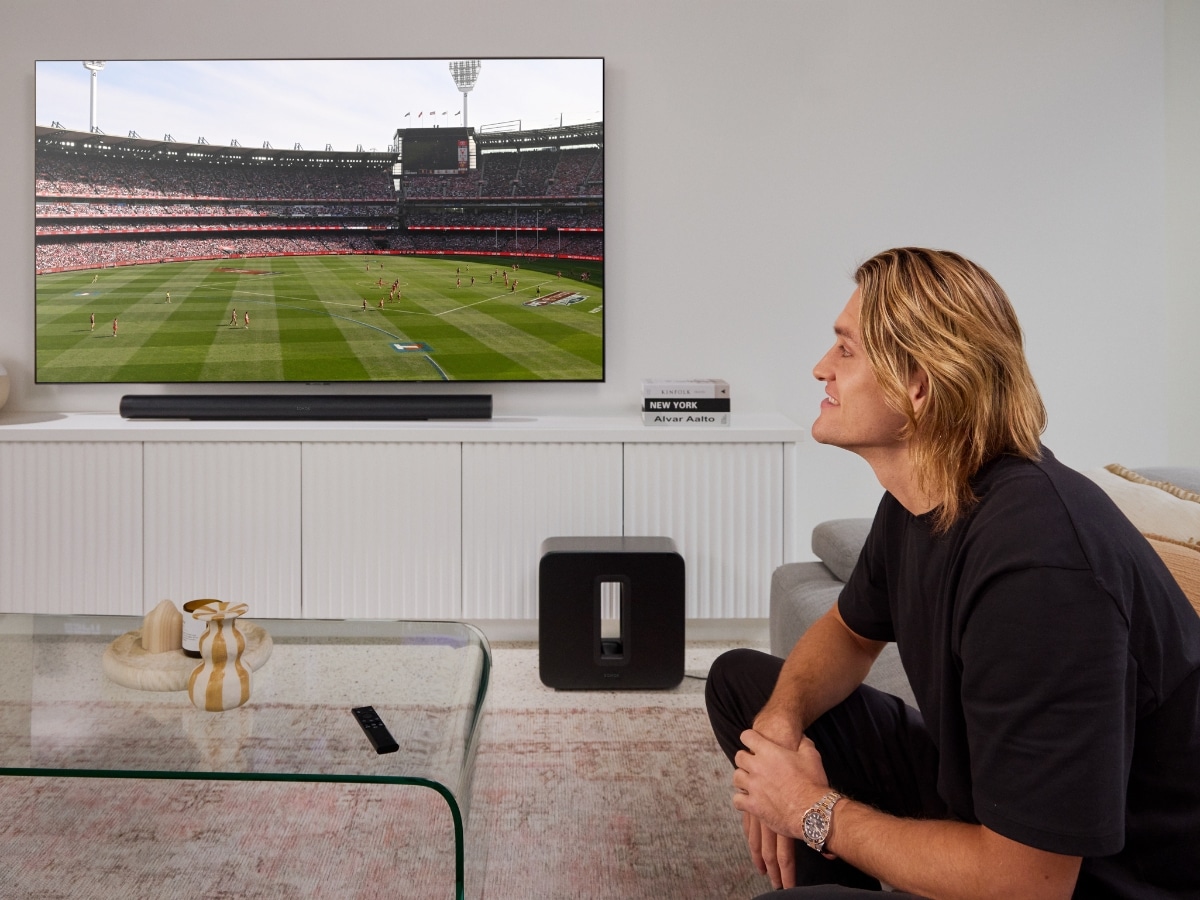
Coming off the field, do you use music post-game to help you decompress?
We don’t tend to use music at our home games, just because our rooms are overflowing with people. Often it’s more about connecting with family, friends, and supporters after the game. But whenever we’re on the road as a team, playing in WA or Queensland or wherever, we’ll always put the tunes on in the locker room, particularly after a win. There’s something comforting about playing music together as a team, enjoying a win on the road. When you’re out of your comfort zone against opposition fans, a few records will always get a spin.
You’re a bit of a movie buff. How does that help you make the most your downtime?
I’m a big sci-fi fan. I watched Dune for the first time at IMAX with my sister, who’s actually a film director. I walked away from it, and the first thing I said to her was how incredible the sound was. It was one of the only times I’ve genuinely noticed that. It was so immersive. It’s the silence at the start of the movie, and then that deep, guttural alien language that comes on.
I still remember the first time I heard that and thought, “Whoa!” So, after that experience, I had a Sonos Arc Ultra put in at home with the surround sound set up, and the first thing I played was Dune. It just took me straight back there. It did not disappoint. In terms of world-building, it’s just the best of sci-fi. And I think the sound elevated it to a new level. It was crazy.
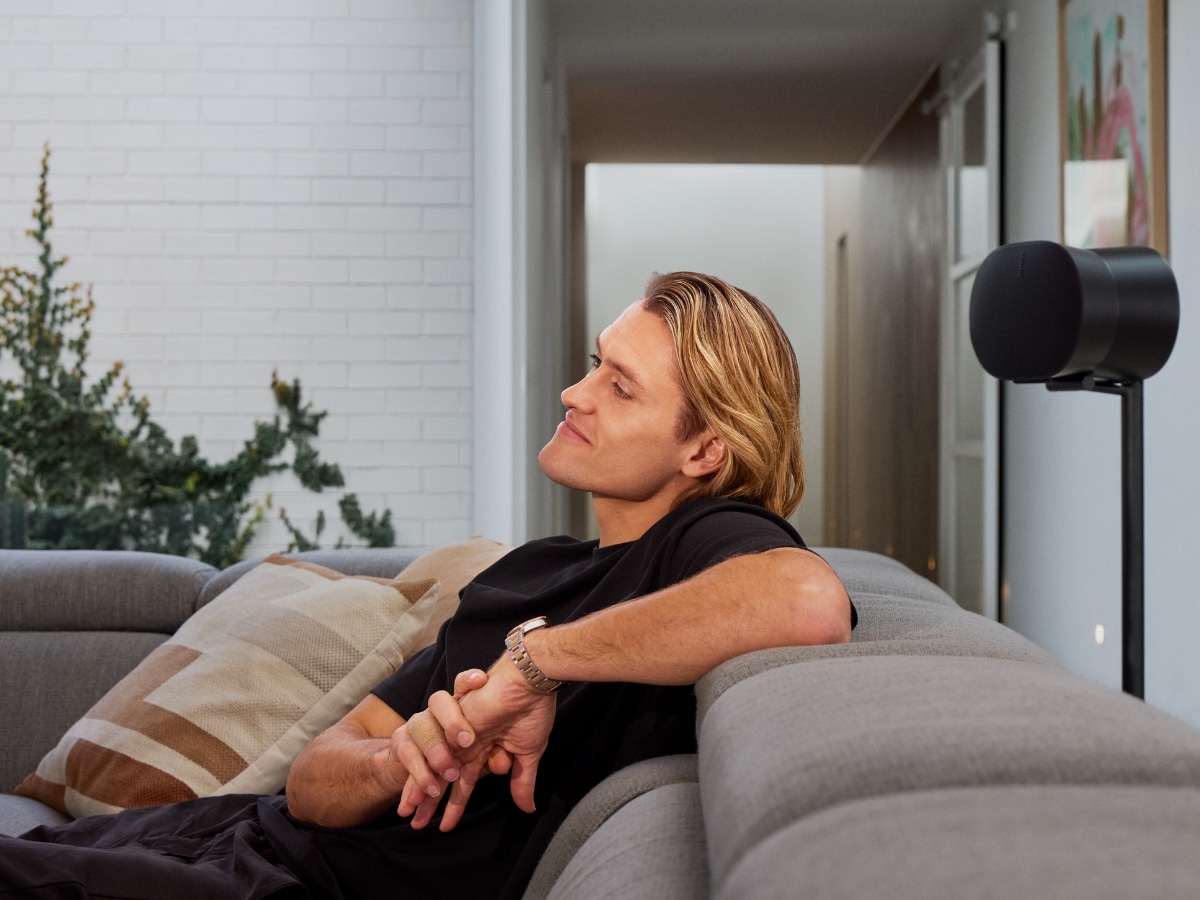
Much of what we’ve discussed ties into mental health, and I know you’ve been a strong advocate around that. How do you keep yourself on an even keel, and what measures do you take to ensure your players are fit mentally as well as physically?
There are a few layers to this. For me personally, I have a psych that I meet with regularly, whether I’m struggling or feeling great and coping well with everything, I make sure I make time to touch base with them, almost like a mental health hygiene thing, like brushing your teeth.
In my role, it’s often about making people aware of the resources they have around them. We’re lucky as players in that we have a network of wellbeing services around us. So I spend a lot of time letting guys know about that and reminding them that you don’t have to wait until you absolutely need it to be able to call on it.
Day to day, I try to be approachable and have those difficult check-in conversations. I think that’s a skill that you can get better at. As men, we’re not as naturally inclined to do that, or we’re not socialised to do it as well with our mates. So, a big part of my leadership is to check in with guys in a way that’s non-judgmental, and creates a space where they can talk through anything. Whether they’re struggling or I can just get a bit of a temp check on where they’re at with their mental health.
You’re also the president of the AFL Players Association. Is there anything you’re pursuing in that capacity?
It’s something that’s been spoken about a lot. In the last few months, we’ve had some really high-profile tragedies in our industry when it comes to men’s mental health, which is just a reminder of how important this work is.
I’m so proud of what the Players Association offers in terms of a service provision to AFL players and AFLW players. The access to a psych network, a wellbeing network, is incredible. The issue that we’re seeing is that uptake is increasing. I think the last Impact Report said it was up around 25 per cent year on year, which tells us that it’s in demand, and the barriers to people seeking help are coming down, which is a good thing. But on the other end of that, the mental health system broadly is under a lot of pressure and very much under resourced.
So I think that’s the biggest issue that we see. We create an incredible pathway to mental health resources, but it’s just about getting more of them in the health system to help people. It’s not one size fits all, as people have different needs, so I think the way we’ve rolled out a pretty bespoke needs-based system is something I’m extremely proud of.
And rightly so. Darcy Moore, thank you for taking the time to speak to Man of Many.
Thank you!



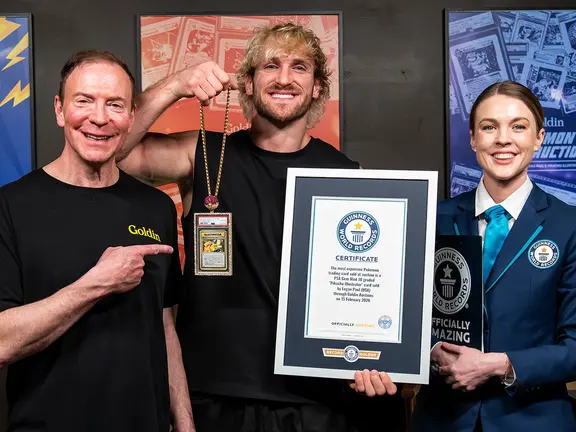




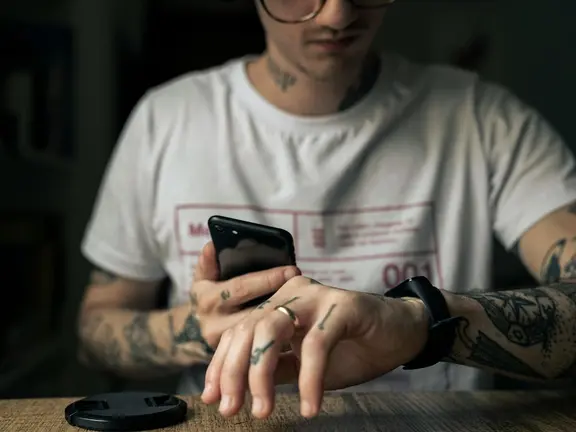




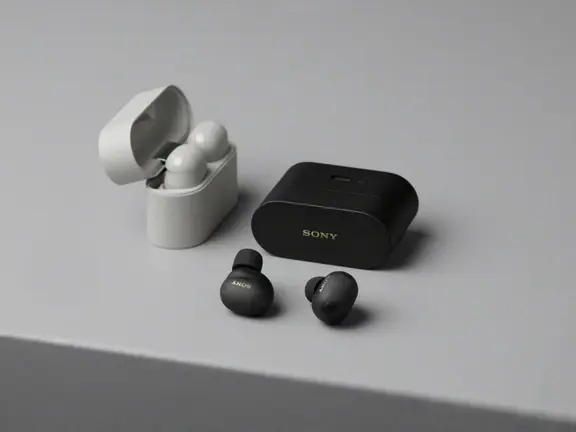

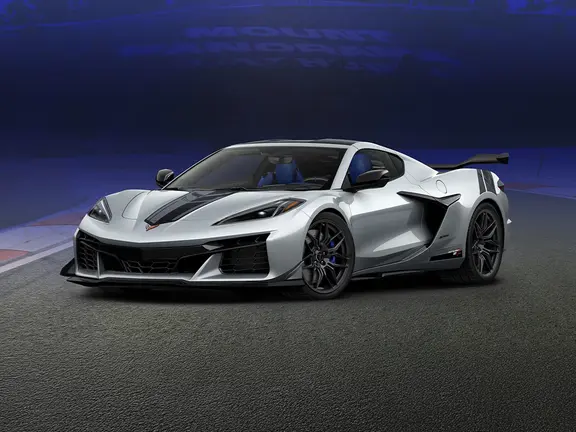







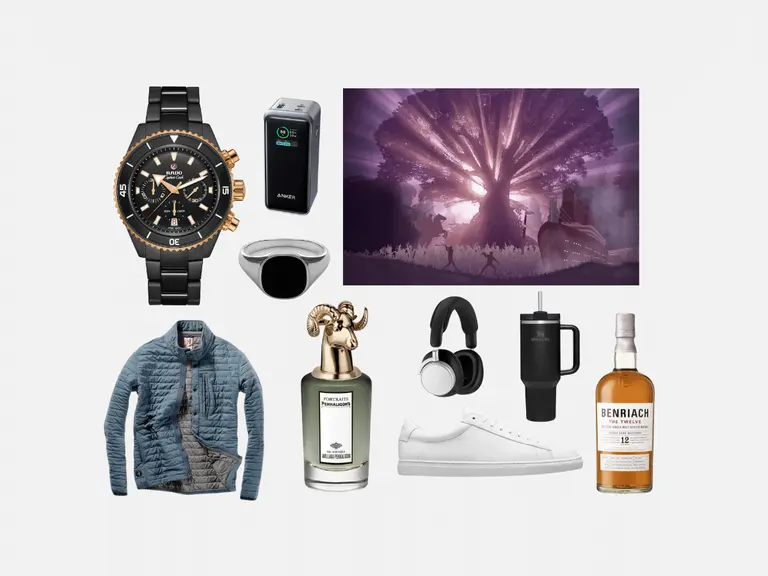





Comments
We love hearing from you. or to leave a comment.